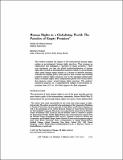| dc.contributor.author |
Emile M. Hafner-Burton and Kiyoteru Tsutsui |
| dc.coverage.spatial |
United States |
| dc.date.accessioned |
2016-01-07T15:26:43Z |
| dc.date.available |
2016-01-07T15:26:43Z |
| dc.identifier.uri |
http://desa1.cejamericas.org:8080/handle/2015/2118 |
| dc.description.abstract |
The authors examine the impact of the international human rights regime on governments’ human rights practices. They propose an explanation that highlights a “paradox of empty promises.” Their core arguments are that the global institutionalization of human rights has created an international context in which (1) governments often ratify human rights treaties as a matter of window dressing, radically decoupling policy from practice and at times exacerbating negative human rights practices, but (2) the emergent global legit- imacy of human rights exerts independent global civil society effects that improve states’ actual human rights practices. The authors’ statistical analyses on a comprehensive sample of government re- pression from 1976 to 1999 find support for their argument. |
| dc.language.iso |
English |
| dc.title |
Human Rights in a Globalizing World: The Paradox of Empty Promises |
| dc.ceja.source |
Fuente: American Journal of Sociology |

